Tips for Living in a Van in Winter
Thinking about living in your van during the winter? Learn everything you need to know about wintering your van for comfort and safety
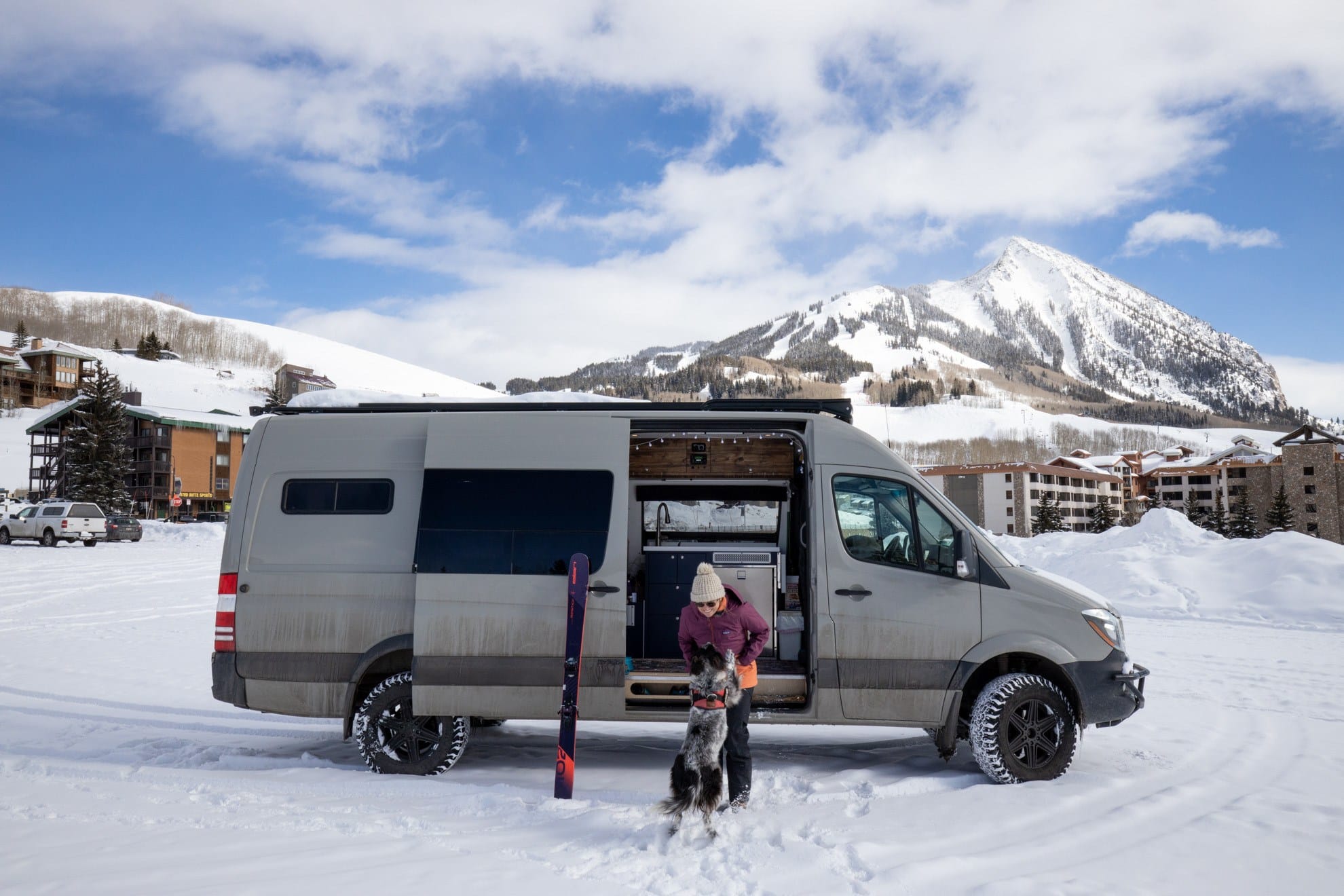
When most people visualize van life, they imagine summer road trips, camping near the beach, and spending ample time outdoors in nature. But what if you plan on doing van life full-time, even during the winter months? In this lesson, I’ll talk about living in the van during the winter and how to winterize it if your van is going to sit still in the colder months.
In previous resources, we discussed insulation, heaters, and how to winterize plumbing, but I’ll elaborate a little more on that here. I’ll also share some of the obstacles you might encounter in winter and solutions that make van life a bit easier in cold weather.

This post may contain affiliate links.
Challenges of Living in a Van During the Winter
Traveling in the van during winter has different challenges than warmer months. Here are some things to keep in mind.
1. Cold Temperatures & Less Daylight
It can get very cold in winter, and it could snow depending on where you go. If you’re into winter sports like skiing and snowboarding, this is your season! But you need to be prepared to stay warm in your van once the sun goes down with blankets, insulated window coverings, and probably also a heater. Once your windows are covered, cooking hot meals inside the van can also bring the temperature up real quick.
Since the sun goes down early in the winter, the early evening can be a good time to take care of some computer work, catch up on books, play games and music, or pick up a new hobby. You’ll be staying inside a lot more than you did in the summer so finding ways to entertain yourself will stave off cabin fever.
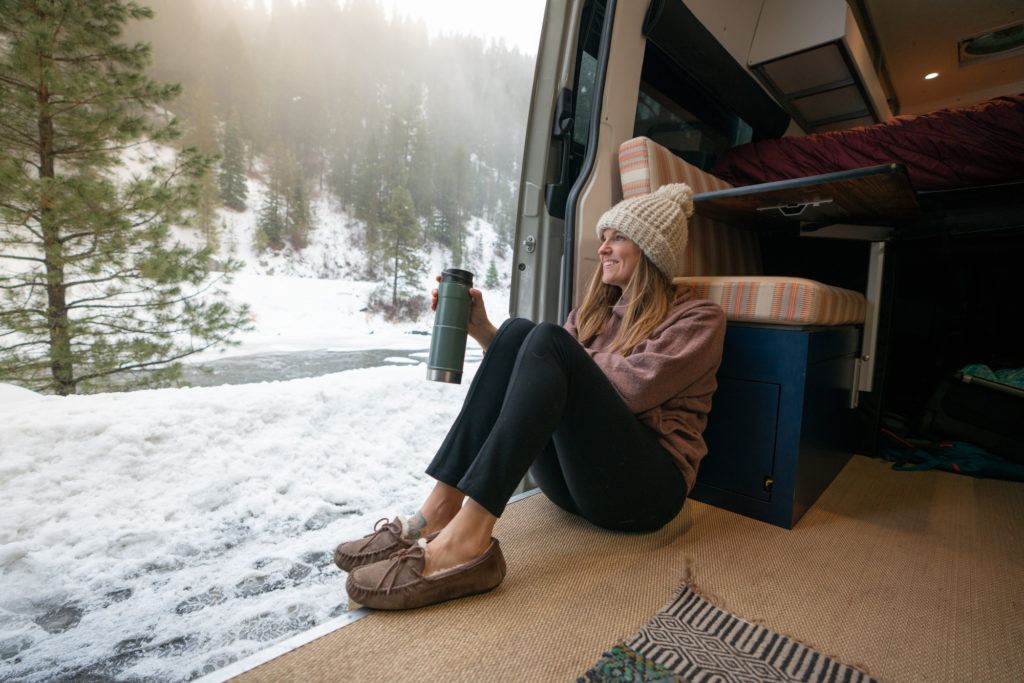
2. Many Roads and Campgrounds are Closed for the Winter
Another thing to know about van life in the winter is that a lot of parks, campgrounds, and roads are closed throughout the cold, snowy months. Some are closed all season long and others close periodically, so check with the local offices to make sure you’ll be able to get in and out when you need to.
3. Winter Driving Can Require Special Gear
If you do end up adventuring on snowy roads in your van, consider investing in chains and MaxTrax recovery boards. The recovery boards come with a hefty price tag but have raving reviews from off-roaders saying these boards will bail you out anytime you get stuck in snow or sand.
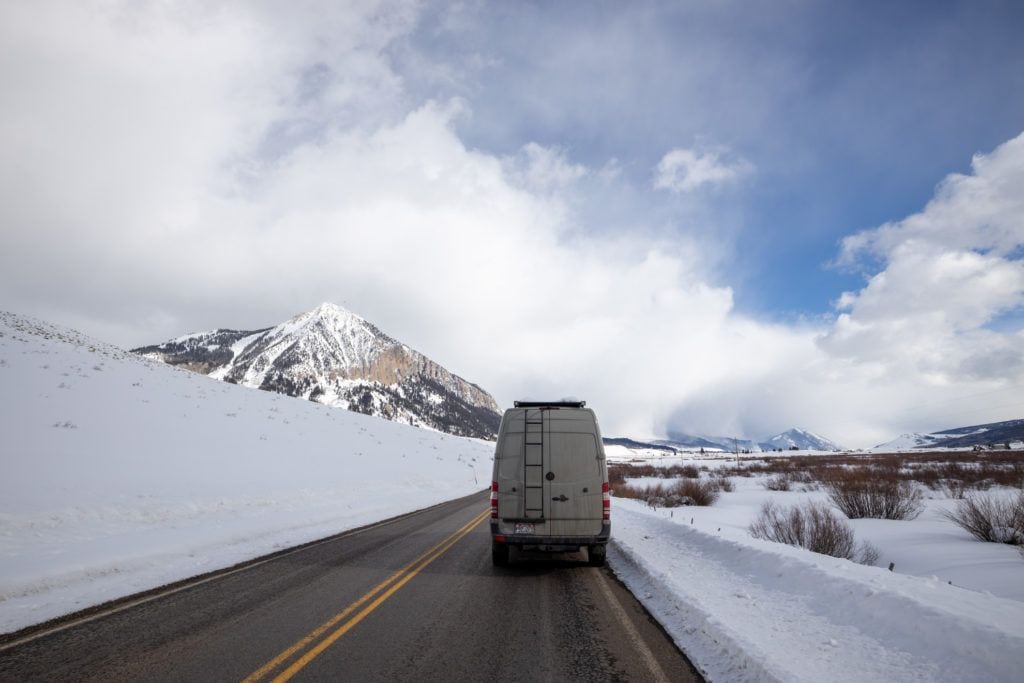
4. Van Plumbing Needs to be Winterized
Winterizing Plumbing for Year-Round Travel
Year-round traveling in a van is an awesome experience, but it requires some additional steps to make sure your build stays intact. Specifically the plumbing. Just like in a regular house, it’s imperative that you prevent frozen pipes in the van.
- If you’ll be using the van daily and your plumbing is inside, then all you need to do to protect your pipes is make sure the temperature never drops below freezing in the van. This might mean keeping the heater on 24/7 even when you’re not inside the van.
- If you have water pipes running outside of the van, then you’ll need to wrap them with pipe insulation and heat tape, at a minimum, to prevent freezing.
As I mentioned in the lesson on van water systems, if you know that you want to use your van throughout the winter, then you should plan accordingly during your conversion by keeping all of your pipes inside.
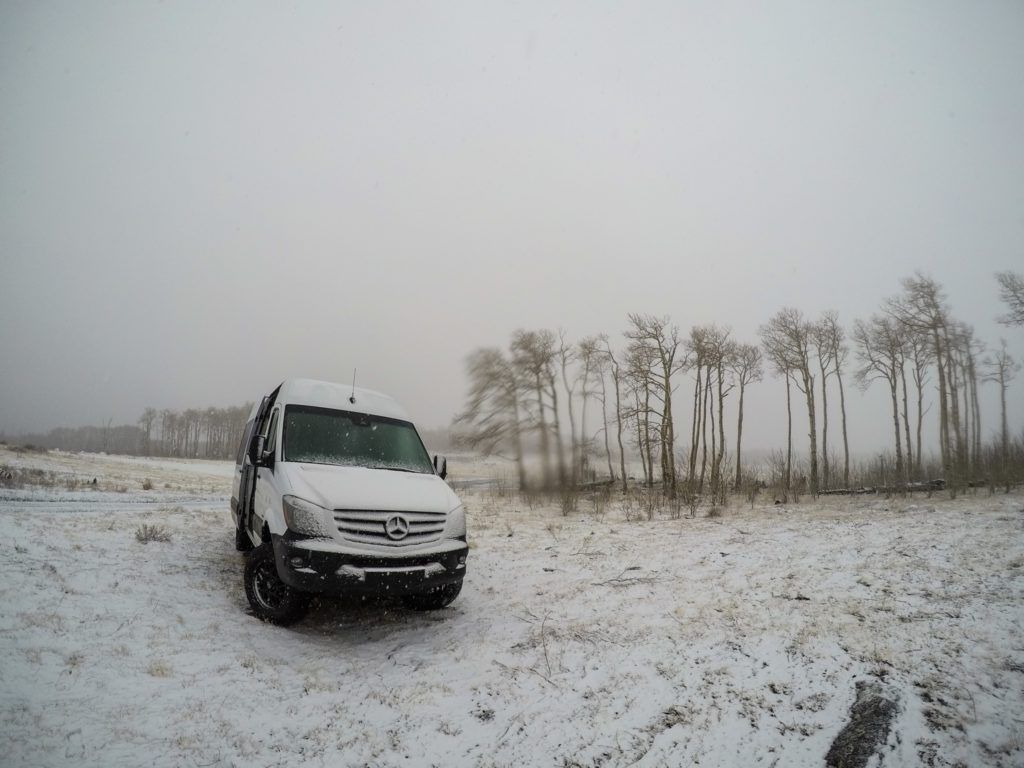
Winterizing Plumbing for Winter Storage
If you won’t be using your van much during the winter and it will be parked in sub-freezing temps, the best bet is to completely drain the plumbing system, including the tanks, pipes, and water heater. If necessary, you can add a non-toxic antifreeze to the pipes which is specifically made for RVs and boats. That should keep everything in good condition throughout the winter.
You’ll also want to completely empty out and clean your grey and black water tank if you have them. Otherwise, waste will harden onto the tank over the winter and make for a pretty gross chore once the spring thaw comes.
Save this post!
Enter your email & I'll send this post to your inbox! You'll also receive my weekly newsletter full of helpful advice for planning your adventures.
Winter Alternatives for Van Lifers
If you don’t dig the idea of being cold, especially if you’ll be without a heater, you can always head south for the winter. A lot of travelers move with the seasons and head south to Arizona, Mexico, Texas, and Florida.
It’s a good time of year to see other parts of the country that are often too hot to enjoy in the summer months.
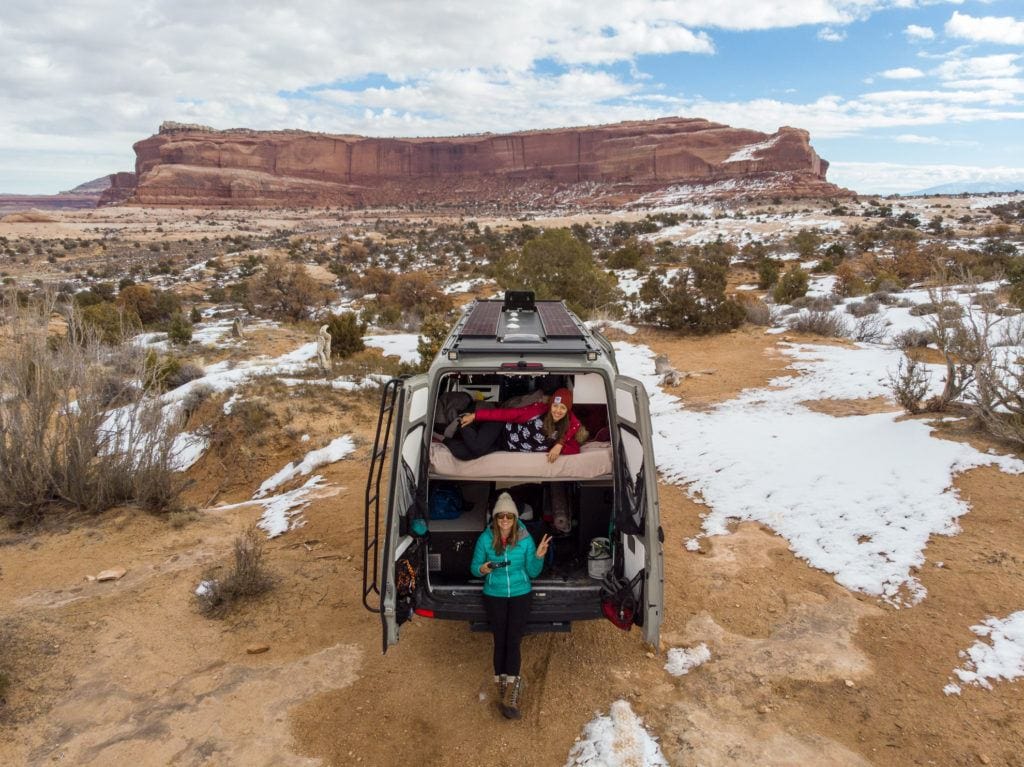
Have you spent a winter in your van? What was your experience? Share your questions, tips, and experiences down in the comments, and make sure to sign up for updates here.

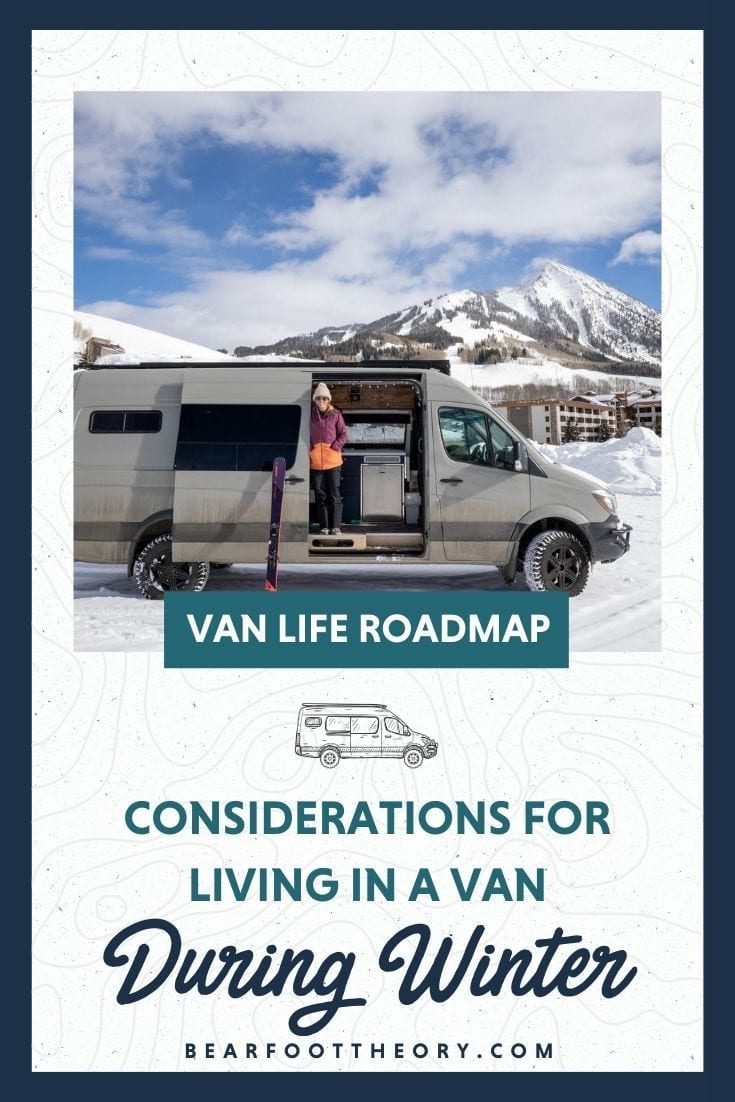
Those considering four-season use of your van, and/or folks whose vans are located in regions that include below-freezing temperatures have important design decisions to make regarding their van design. First and foremost is the issue of what happens when the temperature drops below freezing even for a few hours. It only takes a single below freezing event to do serious damage to any systems with water in them. Once those systems are damaged, undoing the damage is typically a non-trivial operation. So, if for example, your solution is to ensure that the temperature of your water-bearing systems never freeze because you heat them, then you need to have 100% confidence that you never lose power or run out of fuel to power your heater. And you need to remember to turn the heater on and keep it going 24/7 in the period when cold is a possibility. The Internet and YouTube are rife with sad tails of folks whose van plumbing froze despite their best intentions. The alternative we chose, is to design a van that does not have freezable internal plumbing. (Or to be a little more accurate) who’s internal plumbing could freeze without catastrophic effect.) Thus, we have no fresh or gray water tanks, but use swappable Jerry-cans (five 6-gallon plastic fresh water Jerrycans, and one 6-gallon gray-water Jerrycan). Similarly, our shower system uses a fill-when-using bladder. We drain our showers into a bucket placed under the van and then disposed of appropriately. The net effect is that we never have to worry about freezing damage to our plumbing systems. [All that said, we left filtered water in our 30-cup Zero-Water dispenser, it froze one night, and bingo, trashed dispenser.]
Was your heater in the cabin not on when your Zero water dispenser froze? I can’t imagine that happening if you kept the inside of the cabin at 50-60 degrees for overnight sleeping…just curious!
Hi Kristen, first, thank you for all your helpful information to consider for those of us planning and building our DIY vans for van life. I do have a question for you – I have been reading that many propane cooktops won’t work above a certain altitude, and I was wondering about that, as we decided to use propane as we love cooking with gas, over electric/induction, but now we are concerned that even in summer if we go above 8000′, we may not have a working stove. Any thoughts on this? Thank you, and happy travels.
Hi Brenda – we’ve used our propane stove above 8,000ft and haven’t had an issue. I know some people report challenges with propane at altitude, but it’s not across the board.
Hi Brenda – At one point in my career I was General Manager for a ski resort day lodge on top of Mt. Pluto in Tahoe. My team and I have had many challenges to overcome at that altitude – 8600′ as I recall. Propane does indeed work but keeping it warm enough to expand and ignite can be an issue. We would throw the tanks into an electric warmer oven (yes!!) on colder days to get the gas flowing. Also, water boils at significantly lower temps. I think we were boiling water at 196F. This sloooooows dooooowwwwn your cooking more than you would think. Until you get used to the longer cook temps, pasta and rice can be exceedingly frustrating to cook! Stews take a wicked long time – braising meats is a better bet. Thickening with roux or other starches can yield unexpected results like raw flour flavors, etc. But overcoming these and other challenges are the spice of life. Learn and enjoy!
Having spent the past three winters in a Sprinter Van on the Kenai Peninsula in Alaska I think I have the cred to comment!! A few of the more important bullet points:
– When it hits -20F your water WILL freeze at some time or other (unless you don’t ever leave). Love the 6 gal internal system recommended by Bearfoot. That is what I use. Get in the habit of draining your pipes when the temps get into WTF territory. I learned this the hard way going through the Yukon one particularly cold Spring commute. Repairs cost bukko bucks.
– Plan on not opening your side door. Use the driving compartment as sort of an Arctic entrance. The back door frequently freezes shut, too. Its a hassle at first but you work it out.
– Propane heat is not your friend. Too much water. DON’T DO IT unless it is an emergency or very temporary and then make sure your ceiling fan is open (which I do most nights anyhow because of water in my breath). My heat is an Espar now. Fantastic. Electric heat works if you are hooked up but only to a point in extreme cold. I hear there are other alternatives (including wood burners which many use up here) but my diesel heater with a 12volt internal fan is amazing. Well worth the costly investment if you are serious about winter van life. Check all the specs on the heater before purchase – I hear there are some Espars that don’t stay on all the time
– Insulate everything! I have R15 on the walls and ceiling. Window insulation is closed-cell R10 that I have shaped to proper size. I wish I had better insulation on the floor – only R6 with two layers of material above that as I recall. Directing the Espar airflow to the floor helps with that. I also have blackout curtains, fleece and various other tricks to foil the inevitable drafts.
– Don’t neglect the driver’s cab part of your vehicle when fighting cold. I have window insulation but that does not prevent it from freezing most of the time since I keep it thermally separated from the living quarters. My first year I had propane heat supplementing my electric and ran into a huge frost problem on the windshield and ceiling. I now thaw it out often – almost daily until the temps dip below zero – by opening up my blackout/fleece curtain. The bonus is that I can use that area as a passive cooler/freezer with minimal hassle until the temps rise into the 40s.
There are many, many other tricks that I have picked up but discovering them is part of the fun. The ones above are the ones I wish I had known for my first year. Could have saved myself more than a few $ spent on repairs! BTW – I love living in the van in the winter, especially because I can take my home and park it at Alyeska Ski Resort during ski season. I wake up at home, open the doors and am magically transported to the base of the mountain. For zero cash. People spend thousands of dollars to have that privilege!!
Second many of the things Ross says below. Biggest thing I’d do differently is not put windows on the rear doors, and insulate/cover them completely. I have insulating curtains across the sliding door area, and use the driver’s door to go in and out, wish I could insulate that door too but the curtains help. Exposed bare metal anywhere in the van is the first entry point for the cold. I have a temp gauge in the garage by the back door, and see that the garage is usually 10 degrees or more colder than the heated cabin (I have a fixed platform bed, and don’t have a door closing off the garage from the cabin area.) Make sure you have warmers for your batteries, the LiFePo batteries start draining when they get down into the 30 degrees temps. Which then means you’ll need shore power if you’re not going to be driving for awhile or have substantial solar to recharge batteries. For cold floors I have those padded kitchen mats on the floor.